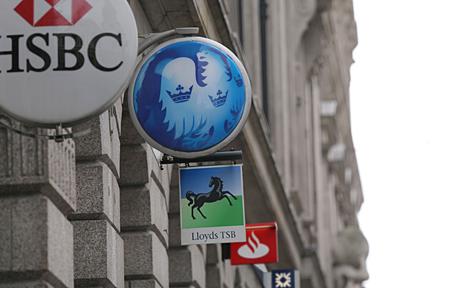UK banks face break-up threat as watchdog plans competition probe

Britain’s big banks could be broken up after the country’s new competition watchdog said it plans to launch an 18-month investigation into services for small business customers and personal current accounts.
The Competition and Markets Authority (CMA) said on Friday there was a lack of competition among banks and proposals that lenders put forward to increase transparency and make it easier to switch did not go far enough to meet the needs of personal consumers or small and medium sized enterprises (SMEs).
The CMA – which was formed as Britain’s new competition watchdog in April – can order structural remedies, such as breaking up banks considered too dominant, and behavioral remedies, such as improving information given to customers.
State-backed Lloyds Banking Group and Royal Bank of Scotland are the biggest banks for both current accounts and SME banking, and are most at risk of being told to cut their market share, potentially by selling more branches.
“Our studies have found that despite some positive developments, significant competition concerns remain which mean that customers may not be getting consistently good service and value from their banks,” said Alex Chisholm, CMA chief executive.
A full investigation would take about 18 months, so it would be early to mid-2016 before any remedies were proposed.
The UK’s big four banks, which also include Barclays and HSBC, hold 77 percent of the 65 million personal current accounts in Britain, and have 85 percent of the 3.5 million business current accounts and provide nine out of every 10 business loans, the CMA said.
Shares in RBS fell 1.6 percent and Lloyds was down 1.1 percent by 0311 ET, the weakest stocks in the European bank index. Barclays and HSBC were both down 0.4 percent, in line with the bank sector.
LITTLE CHANGE
Studies released by the CMA into current accounts and SME markets showed barriers to entry for newer and smaller banks remain significant, there is little movement in the market share of big banks, customers see little difference between the services on offer from the big banks, and there is little transparency to compare prices such as overdraft fees.
As a result, levels of switching are low. Only 3 percent of current account customers switch each year and only 4 percent of SMEs change bank, the CMA said.
The CMA had been expected to launch a full probe into SME banking, but it was less certain it would propose a wide-ranging investigation of current accounts.
The Federation of Small Businesses said the investigation of SME banking should force the banks to “up their game” and wants barriers to entry for new banks to be reduced, including for alternative finance providers.
“The goal should be to deliver a market structure that encourages far more dynamism, choice and innovation,” said John Allan, the FSB’s national chairman.
The CMA said it will make a final decision in the autumn and has given banks and other market participants until Sept. 17 to submit their views. However, it would be highly surprising if the investigation did not go ahead.
The big four banks had proposed improving competition in SME banking by setting up a comparison website to increase transparency and make it easier for companies to switch banks, but the CMA said it would prefer to conduct a full investigation.
It would mark the second full-blown industry investigation being carried out by the CMA. It said last month it would investigate competition among Britain’s energy suppliers.
The CMA took over separate investigations into personal current accounts and SME banking that were started by the Office of Fair Trading. The findings of its studies into current accounts and SMEs was made jointly with the Financial Conduct Authority.
(Reporting by Steve Slater; Editing by Anjuli Davies and John Stonestreet)
Source: Reuters





























